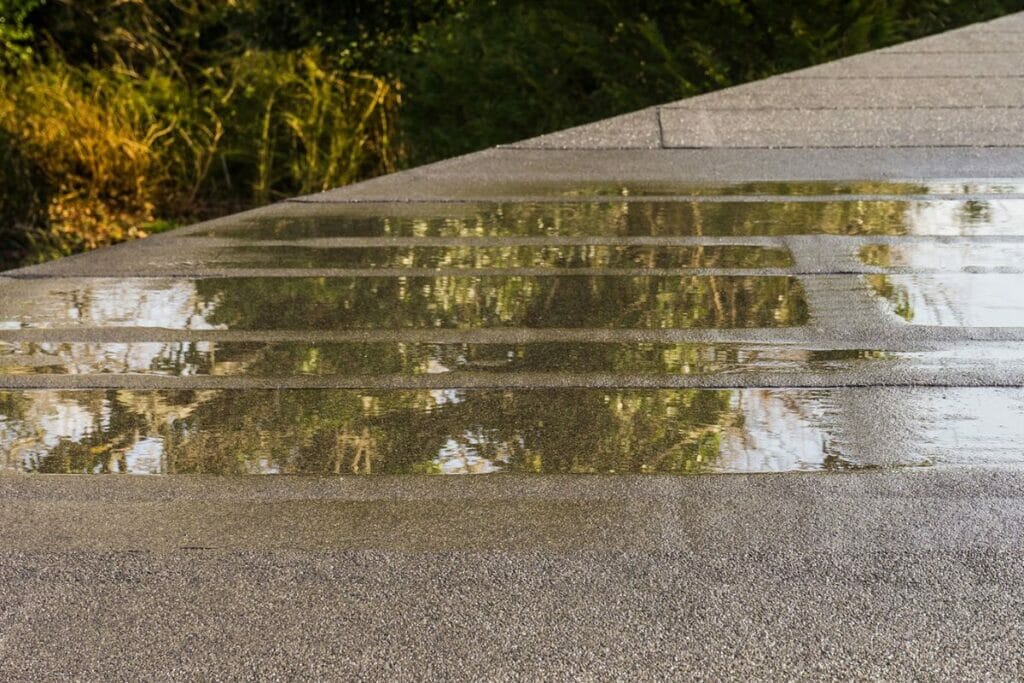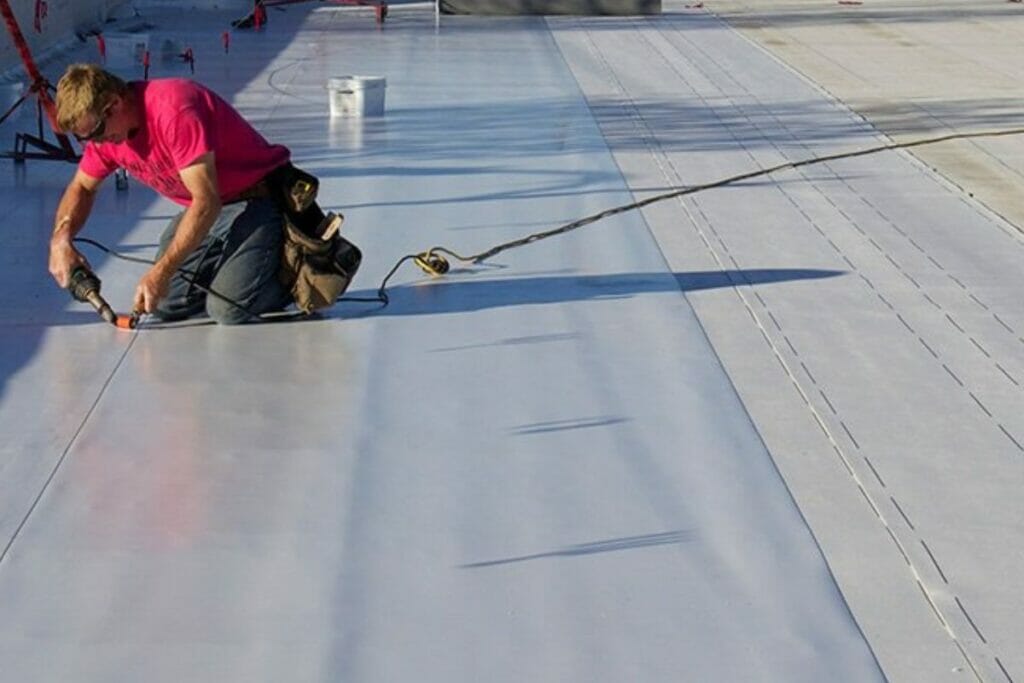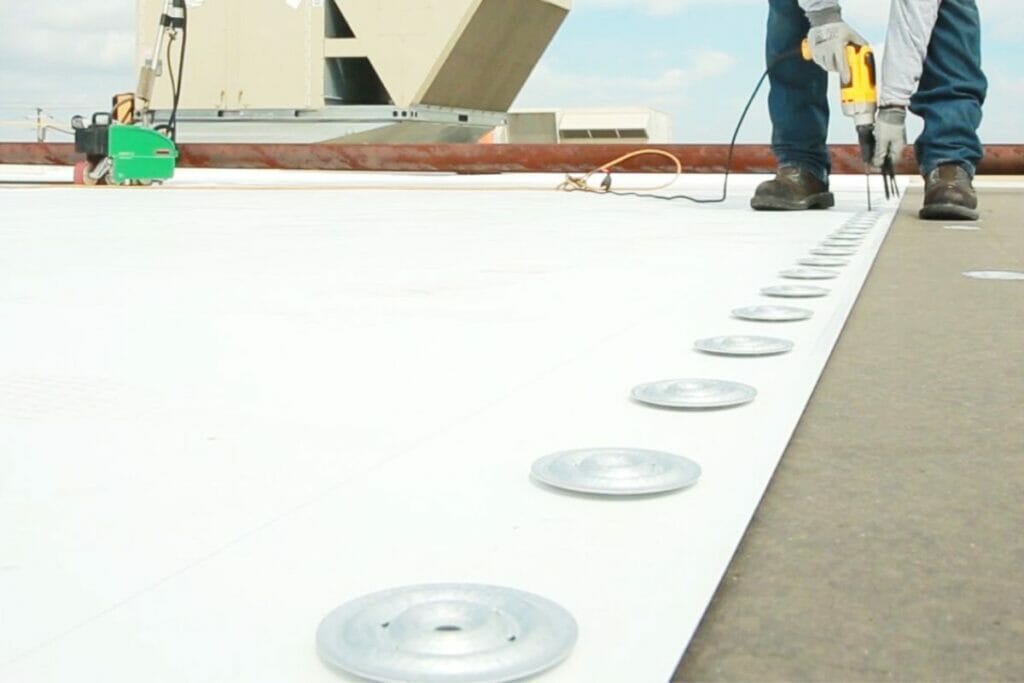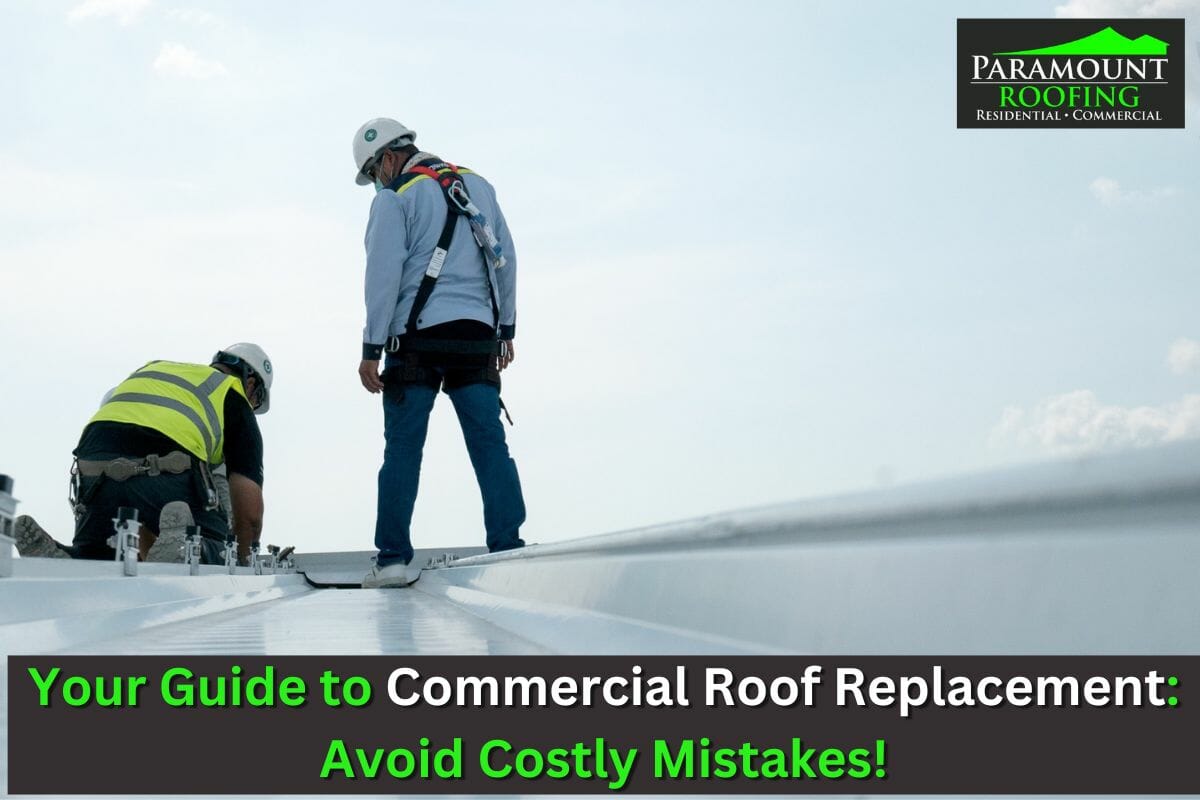Do you think it’s time to replace your old or damaged roof? As a roofing specialist, I understand the importance of a safe, well-maintained roof for commercial properties. Whether you’re dealing with a leaky flat roof or considering upgrading to a durable metal roof, this guide will walk you through the essential steps to avoid costly mistakes during your roof replacement process.
The Signs It’s Time For A Commercial Roof Replacement
Recognizing the signs that you need a new roof for your building is essential to avoid potential disasters and costly repairs.
1. Ponding Water On Flat Roofs

Many commercial buildings feature flat roofs due to their practicality. However, flat roofs are prone to ponding water – the accumulation of standing water after rainfall. If you notice pools of water on your flat roof lasting for more than 48 hours after the rain has stopped, it’s a clear sign that your roof has a poor drainage system. Ponding water can accelerate the breakdown of roofing materials, leading to leaks and structural damage over time.
2. Blisters And Cracks In The Roofing Membrane
Flat roofing materials like EPDM, TPO, and modified bitumen are popular choices for commercial properties. Over time, these materials can develop blisters, cracks, or wrinkles. These imperfections compromise the waterproofing capabilities of the roofing system, allowing water to seep through and damage the underlying layers. If you observe any irregularities in your flat roof’s surface, it’s time to get a new roof to restore your building’s integrity.
3. Alligatoring And UV Damage
Flat roofing materials are exposed to intense sunlight and temperature fluctuations, which can cause a phenomenon known as “alligatoring.” This term refers to the appearance of cracks that resemble an alligator’s skin. Additionally, UV rays can cause flat roofing materials to degrade over time, resulting in brittleness, cracking, and reduced waterproofing performance. If your flat roof shows signs of alligatoring or UV damage, it’s wise to explore a replacement option.
4. Torn Or Missing Roofing Material
Strong winds, heavy rain, and debris can take a toll on your flat roof’s surface. If you notice torn or missing sections of roofing material, your building is vulnerable to leaks, water damage, and even interior structural issues. These gaps provide easy entry points for moisture, leading to mold growth and compromising the building’s integrity. A commercial flat roof replacement can address these vulnerabilities and provide a seamless, protective barrier.
5. Age And Deterioration
Just like any other structure, flat roofs have a finite lifespan. Most low-slope roofing materials last around 20 to 30 years, depending on the material and climate conditions. If your flat roof has exceeded its expected lifespan, it’s a clear signal that a replacement should be seriously considered. Delaying the replacement can lead to more frequent and costly repairs as the roofing system deteriorates further.
6. Increased Energy Costs
Flat roofs play a significant role in regulating a building’s temperature. If your energy bills have been consistently rising, it could be due to poor insulation or ventilation in your flat roof. An aging or damaged flat roof can compromise a building’s energy efficiency, forcing HVAC systems to work harder to maintain comfortable interior temperatures. Choosing advanced, energy-efficient materials can lead to substantial savings in the long run.
Don’t wait until these issues escalate – consulting a reliable commercial roofer for a thorough assessment can save you from more extensive damage and financial burdens in the future. Moreover, the choice of a roofing company can make all the difference between a smooth, successful project and a costly nightmare.
Choosing The Right Commercial Roof Replacement Company

Let’s understand the specifics of what to look for in a commercial roofing company, especially when it comes to commercial buildings and flat roofing materials.
1. Proficiency In Commercial Roofing Services
The intricate nature of commercial roofing necessitates a company well-versed in the complexities of this service. Opt for a company with an established history of successful commercial roof installation and replacement projects. The experience and expertise amassed while handling comparable projects are telling of their ability to do this type of work.
2. Licensing And Comprehensive Insurance Coverage
The foundation of any credible roofing company is a valid operating license. Prioritize companies that can demonstrate their licensing credentials, thereby ensuring compliance with industry regulations. Equally pivotal is comprehensive insurance coverage, encompassing both liability and workers’ compensation. This precaution safeguards you against potential liabilities arising from accidents or damage during the project.
3. Reputation And Testimonials
Analyze the reputation of prospective roofing companies by reviewing client testimonials and industry feedback. A consistent pattern of positive experiences signifies the company’s reliability, professionalism, and dedication to client satisfaction. Should you need additional proof, don’t hesitate to request references or inquire about similar commercial projects that have been completed.
4. Roofing Material Knowledge
Given your focus on commercial roof replacement, you should partner with a company that’s well-versed in the intricacies of flat roofing materials. Your chosen company should be able to discuss the attributes and limitations of materials such as EPDM, TPO, PVC, and modified bitumen. A thorough understanding of these materials will enable them to guide you toward selecting the best option based on durability, weather resistance, energy efficiency, and budget considerations.
5. Tailored Approach
The variation of commercial properties demands a customized approach to roofing projects. Opt for a company that undertakes an in-depth assessment of your current roof’s condition, identifying underlying issues and proposing a personalized replacement strategy. This approach ensures that your investment yields maximum dividends in terms of durability and functionality.
6. Transparent Financials and Contracts
Transparency in financial matters is a hallmark of a reliable roofing company. Seek out companies that provide transparent and detailed breakdowns of project costs. A proper contract should outline the project scope, material specifications, project timeline, and payment structure. This transparency prevents misunderstandings and establishes a foundation of trust.
7. Robust Warranties and Post-Project Support
A solid warranty is indicative of a company’s confidence in its workmanship and materials. Inquire about the warranties they offer, encompassing both labor and materials. Additionally, ask them to reassure post-project support. A reputable company stands behind its work, offering assistance to address any concerns that might arise after your roof has been replaced.
Remember, your commercial building needs proper maintenance and care, and your choice of a roofing partner greatly influences its integrity and performance.
Now, let’s explore some popular roofing materials that can stand strong against swirling winds, snowy days and hailstones.
Exploring Low-Slope Roofing Materials
Selecting a good commercial roofing material is crucial to avoid issues like water ponding, leaks, and premature deterioration.
1. EPDM (Ethylene Propylene Diene Monomer)
- Durable synthetic rubber material
- Resistant to UV rays and harsh weather
- Lifespan of up to 30 years
- Flexible and easy to install
- Ideal for cost-effective, long-lasting solutions
2. TPO (Thermoplastic Olefin)
- Energy-efficient and environmentally friendly
- Reflective surface lowers cooling costs
- Highly resistant to UV rays and chemicals
- Offers a longer lifespan and requires minimal maintenance
3. PVC (Polyvinyl Chloride)
- Durable and fire-resistant material
- Strong weld seams prevent leaks
- Resistant to chemicals and industrial emissions
- Lifespan of 20 to 30 years with proper care
4. Built-Up Roofing (BUR)
- Traditional choice with layers of bitumen and fabric
- Customizable for specific insulation needs
- Provides robust waterproofing and protection
- Suitable for buildings with complex roofing requirements
5. Modified Bitumen
- Hybrid material blending bitumen and synthetics
- Flexible and resilient in extreme temperatures
- Multiple installation methods are available
- Offers durability and adaptability
6. Metal Roofing
- Durable and long-lasting, with a lifespan of 40 to 70 years
- Reflective surfaces reduce energy costs by reflecting sunlight
- Multiple commercial metal roofing options like steel, aluminum, and copper
- Suitable for various architectural styles and weather conditions
Also read:
Your choice of commercial roofing material depends on your building’s needs, business activities, budget, and local weather conditions. As an expert, I always recommend property owners pick safe and cost-effective roofing materials instead of cheap, risky, and less durable ones.
Finally, to ensure a successful outcome without unnecessary costs, it’s essential to steer clear of common mistakes that can plague such projects.
Avoiding Common Mistakes With A Commercial Roof Replacement

By staying vigilant and informed, you can avoid these roadblocks and enjoy a seamless transition to a reliable, long-lasting roofing solution.
1. Start With A Thorough Pre-Installation Assessment
For commercial buildings, a careful pre-installation assessment is like understanding the story behind your roof. Look out for any pre-existing signs of damage, especially with flat roofing materials. Identifying and addressing these issues beforehand lays the groundwork for a solid roof replacement.
2. Focus On The Importance Of Drainage
Flat roofs have a reputation for allowing water to pool on its surface. However, this doesn’t have to be the case with your roof. Plan a drainage system that does its job efficiently, preventing unwanted puddles of water from causing trouble.
3. Embrace The Warmth of Insulation
Insulation might not be the most visible part of your roofing system, but it’s the cozy layer your building needs. In the world of flat roofs, choosing the right insulation material is like finding the perfect blanket – it keeps things warm and comfortable inside. Ensuring a weatherproof fit. Proper insulation is key to maintaining energy efficiency and keeping temperatures just right.
4. Keep The Roof Sturdy And Durable With Regular Maintenance
Once your new roof is in place, don’t assume you can just stop thinking about it. Regular check-ins are a necessary part of roof maintenance. Inspections, clearing debris, and ensuring water is draining correctly, are all steps to ensure your roof’s longevity and your peace of mind.
Commercial roof replacement companies offer several maintenance plans for buildings with new, and old roofs. If you need a new flat roof for your building in Metro Detroit, our team is here to help you.
Get A Free Consultation On Your Commercial Roof Replacement Project In Metro Detroit
At Paramount Roofing, we understand the profound impact a sturdy and dependable roof can have on your business. We’re not just roofing experts but partners invested in your success. Our roots here in Metro Detroit run deep, and so does our commitment to every project we undertake. Our mission is simple: to provide roofs that endure, radiate efficiency, and reflect your brand’s resilience.
Reach out to us at (586) 690-0227 for a free consultation and discuss your commercial roof replacement project in Metro Detroit.
 Free Estimate
Free Estimate
 Request Service
Request Service Locations
Locations 
